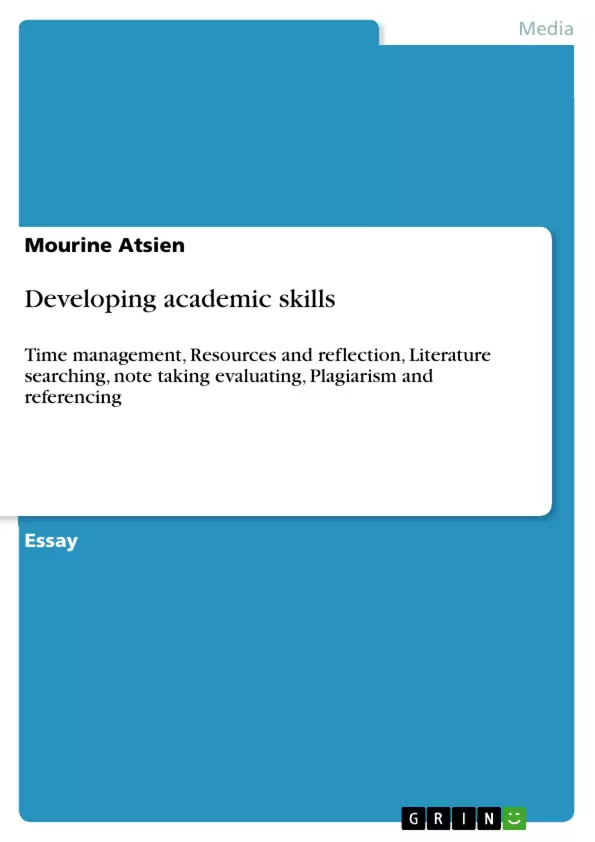Time management is an effective quality in attaining learning objectives. Time management enables the study to allocate sufficient time for every unit in their course (George, 2012). A well-constructed timetable helps in establishing routine and natural rhythm. It also helps the learner in prioritisation and maximisation of their emphasis on the areas of importance. Some of the benefits of having a good timetable include preventing time and energy wastage as it eliminates duplication, confusion and unnecessary repetition of tasks. It ensures that the learner equitably distribute time. It focuses on specific subjects and activities that the learner need to achieve and ensure that the important subjects get more attention and time (Kershaw, 2016). It also helps to formulate good habits such as orderliness, steadiness of purpose and punctuality.
Inhaltsverzeichnis (Table of Contents)
- Task one: Time management
- Timetable
- Reflection on time management
- Task Two: Resources and reflection
- Resources
Zielsetzung und Themenschwerpunkte (Objectives and Key Themes)
This text aims to guide students in developing essential academic skills, focusing specifically on time management and resource utilization for successful learning in tertiary education. It provides practical strategies and insights for enhancing productivity, maximizing resource access, and achieving academic goals.
- Effective time management strategies
- Importance of a well-structured learning timetable
- Utilization of various academic resources
- The role of office hours and mentorship in academic success
- Balancing academic commitments with personal life
Zusammenfassung der Kapitel (Chapter Summaries)
- Task one: Time management
- This chapter introduces the importance of time management as a key skill for attaining learning objectives in tertiary education. It explains how a well-constructed timetable can establish routine, prioritize tasks, and promote efficient use of time. The benefits of a timetable, such as preventing time wastage and fostering good habits, are outlined. The author provides a sample learning timetable for the Communication Skills unit as an example.
- This section focuses on the author's personal reflection on time management, utilizing Gibb's reflective cycle. The author discusses their experiences with time management challenges and how attending a lecture on the topic helped them develop a more effective approach. The author emphasizes the importance of module plans, SMART goals, and to-do lists in managing their time effectively.
- Task Two: Resources and reflection
- This chapter delves into various academic resources that students can utilize to support their learning journey. It highlights the importance of libraries, both physical and digital, as key sources of information. The author also emphasizes the significance of office hours, mentorship, and time as crucial resources for academic success. The chapter emphasizes the need for students to balance their academic workload with their personal lives.
Schlüsselwörter (Keywords)
The primary keywords and focus topics of this text include: academic skills, time management, learning timetable, resources, library, office hours, mentorship, digital libraries, student success, tertiary education, and work-life balance. These themes highlight the importance of effective time management strategies, utilization of various academic resources, and the role of mentorship in achieving academic success in higher education.
Frequently Asked Questions
Why is time management important for students?
Time management is crucial for attaining learning objectives, allocating sufficient time to all course units, and reducing stress by avoiding last-minute cramming.
How does a timetable help in academic success?
A well-structured timetable establishes a routine, helps prioritize tasks, prevents time wastage, and fosters habits like punctuality and orderliness.
What are SMART goals in education?
SMART goals are Specific, Measurable, Achievable, Relevant, and Time-bound objectives that help students stay focused and track their progress effectively.
What academic resources should tertiary students use?
Students should utilize physical and digital libraries, attend lecturer office hours, seek mentorship, and use module plans to organize their workload.
What is Gibb's reflective cycle?
It is a framework used to reflect on learning experiences, helping students analyze their challenges and develop better strategies for the future.
How can students balance academic and personal life?
Effective time management allows students to distribute their time equitably between studies and personal commitments, preventing burnout and ensuring a healthier work-life balance.
- Quote paper
- Mourine Atsien (Author), 2022, Developing academic skills, Munich, GRIN Verlag, https://www.grin.com/document/1326029



